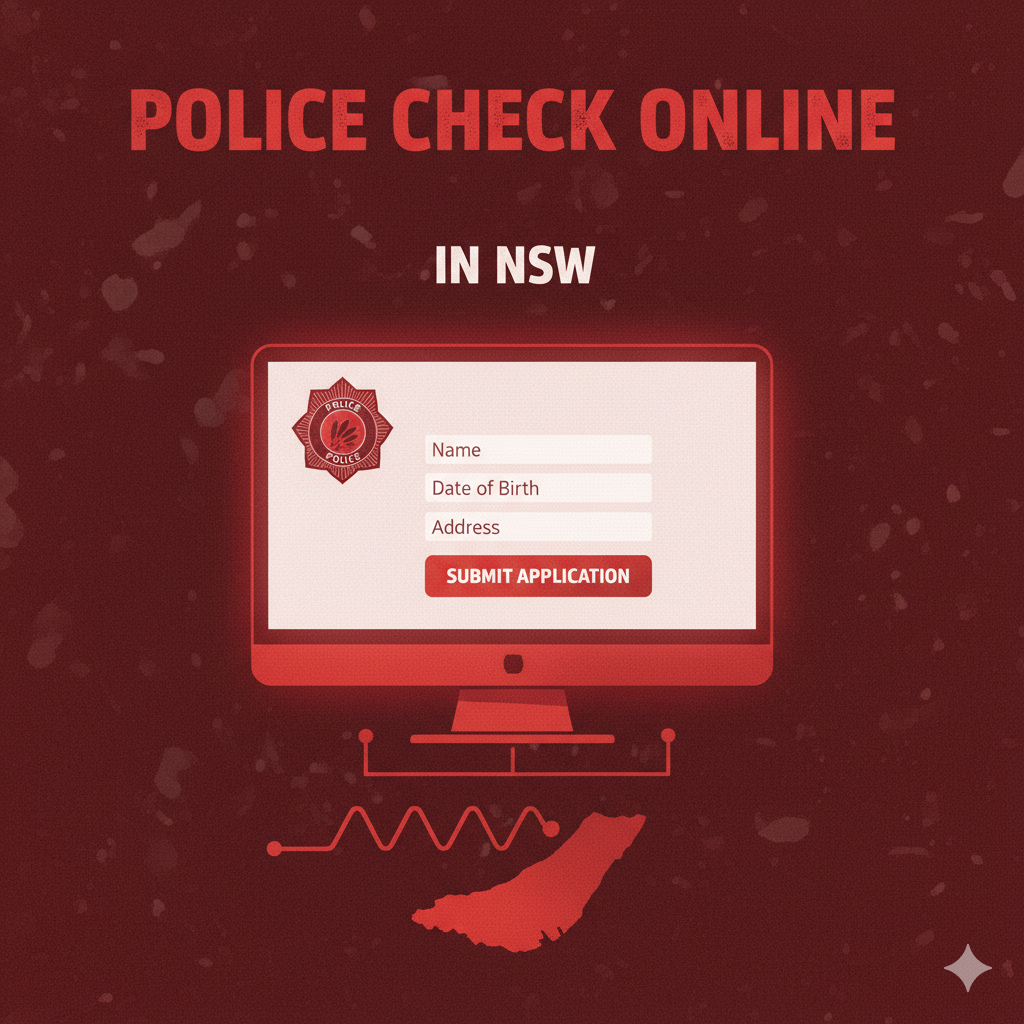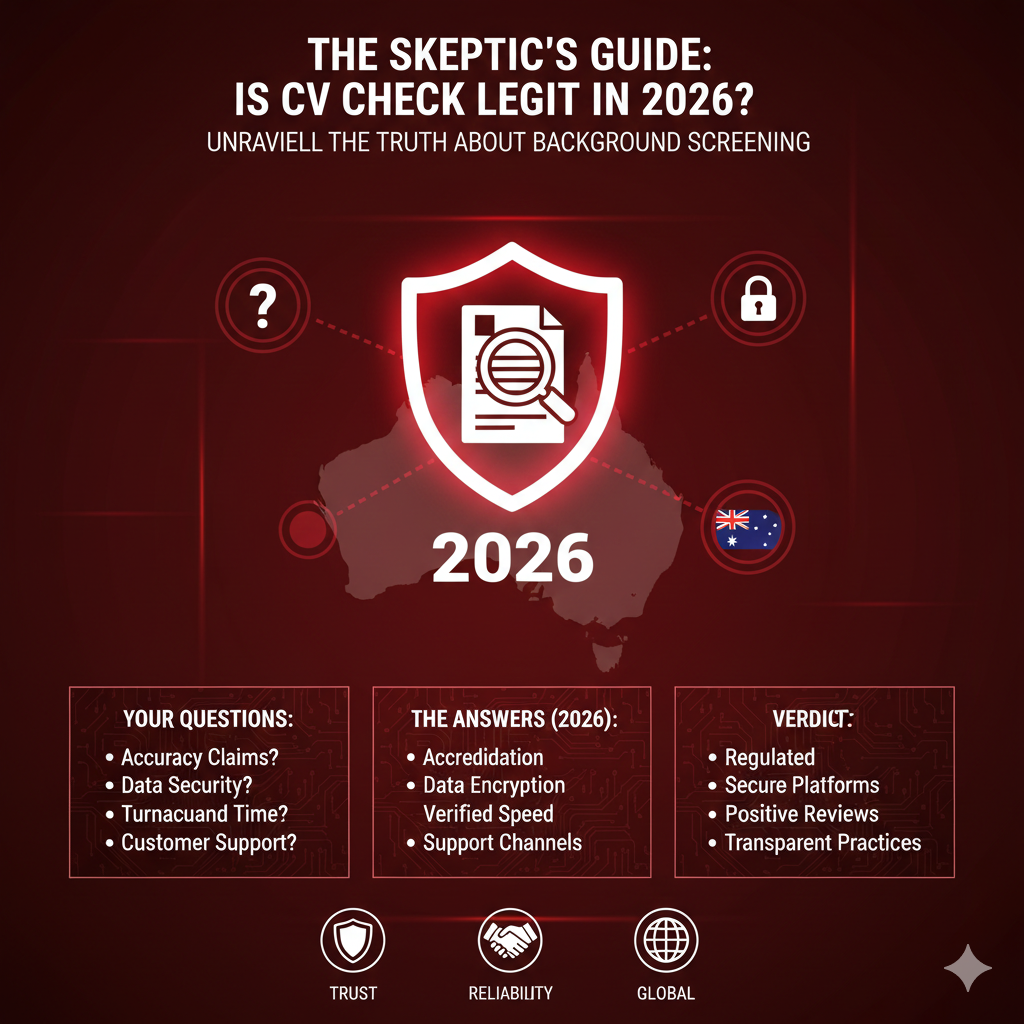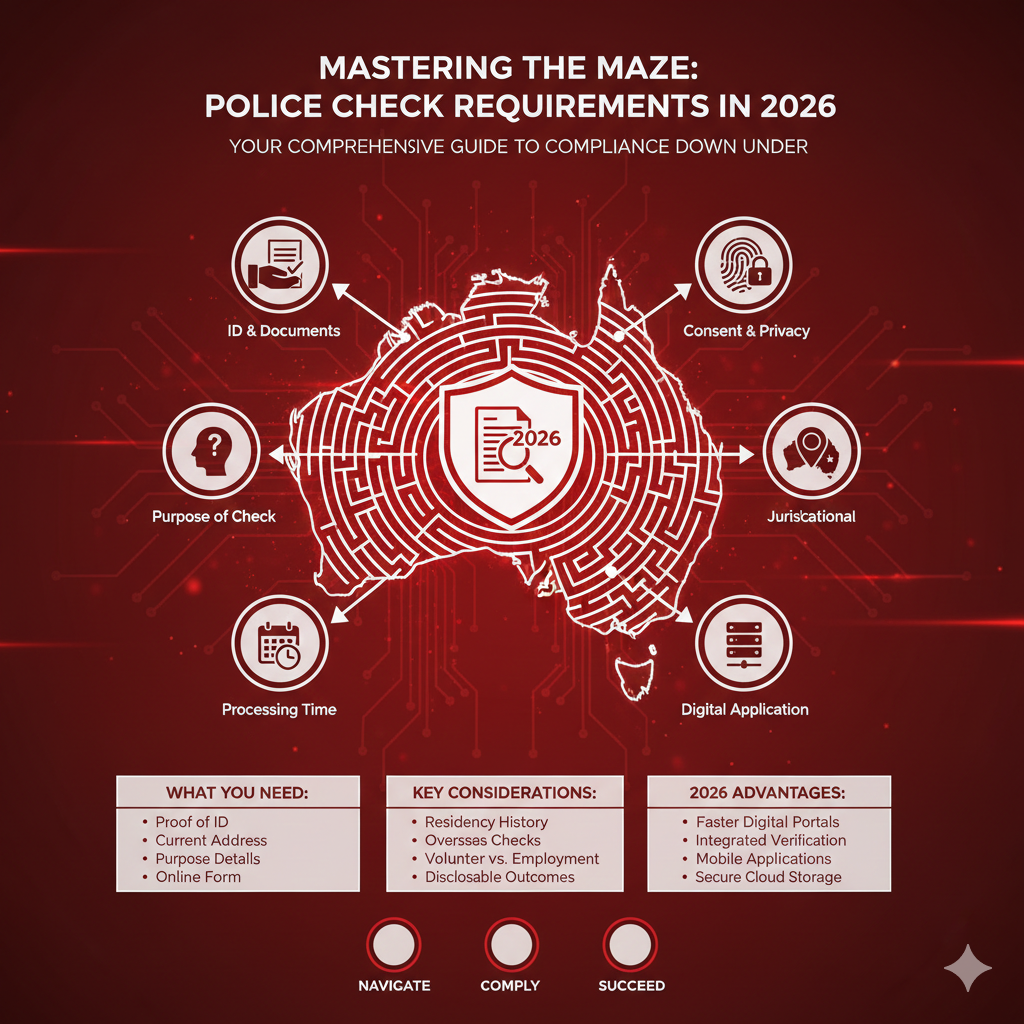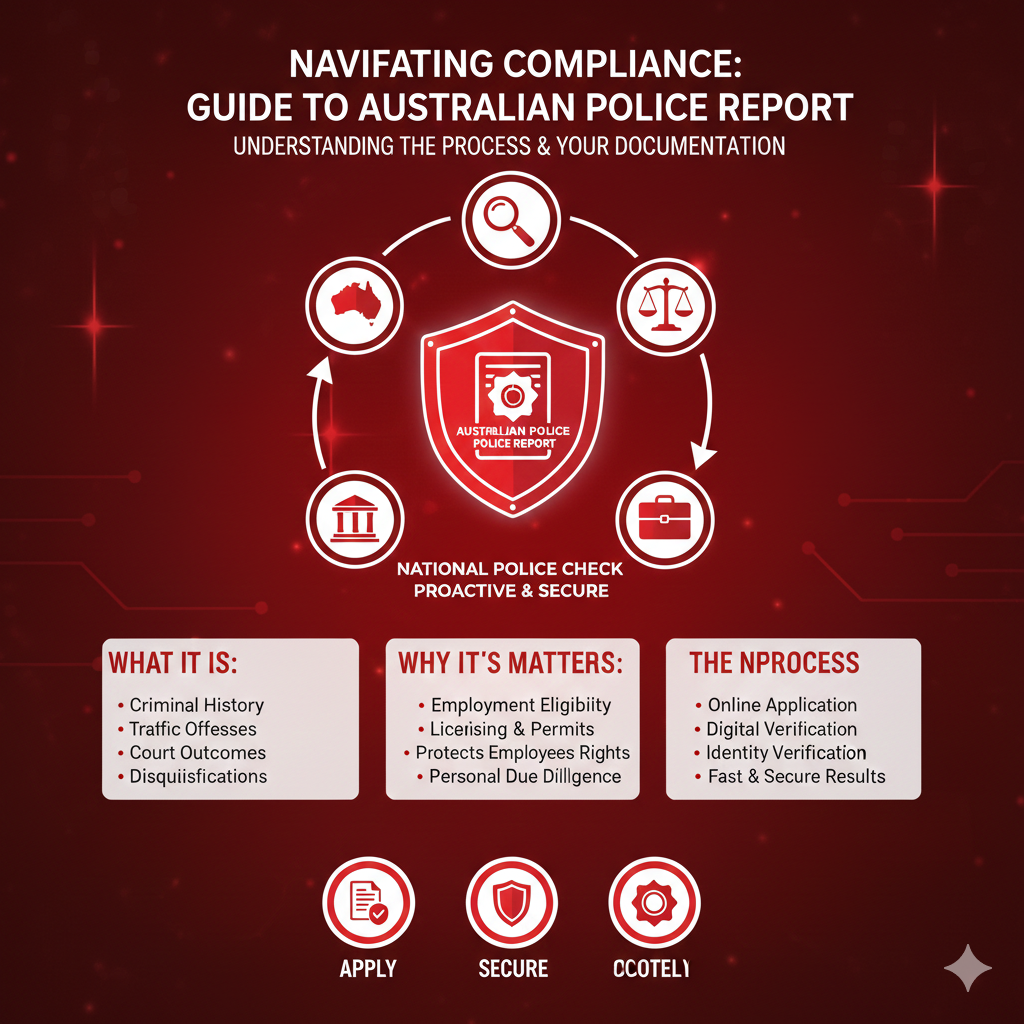Get your NSW police check online easily with Rapid Screening. Learn ID requirements, WWCC differences, and apply from home with fast results.
What is a Police Check in NSW?
When an employer, licensing body, or volunteer organisation asks for a ‘police check’ in NSW, they are almost always referring to a Nationally Coordinated Criminal History Check (NCCHC).
This check is a crucial document that details an individual’s disclosable court outcomes and pending charges across all Australian states and territories. It is a vital tool for ensuring safety, suitability, and trust in various sectors, from finance and healthcare to education and retail.
The Nationally Coordinated Criminal History Check (NCCHC)
The NSW Police Force does not directly issue the NCCHC for employment purposes. Instead, the National Police Checking Service (NPCS), administered by the Australian Criminal Intelligence Commission (ACIC), processes it.
This is a critical distinction, as it means you do not need to visit a police station or a government office to apply. You can apply directly through an ACIC-accredited body, such as Rapid Screening, which has direct access to the national system.
Who Needs a National Police Check (NPC) in NSW?
The requirement for an NPC is widespread across NSW. Common scenarios where you will need one include:
- General Employment: Many companies across all industries require a police check as part of their recruitment process.
- Professional Licensing: Certain professions, such as real estate agents, security guards, and finance workers, require a clear criminal history to obtain a license.
- Volunteer Work: While some child-related volunteer roles require a WWCC, many general volunteer roles for community groups or charitable organisations will require a standard NPC.
- Tertiary Education Placements: Students undertaking clinical placements or industry work experience may need an NPC before they can commence their placement.
- NSW Government Roles: Individuals applying for positions within NSW government departments or agencies often need an NPC to satisfy probity requirements.
Why Apply Online Through an ACIC-Accredited Provider?
The most convenient and often fastest way to obtain a police check in NSW is by using an online ACIC-accredited provider like Rapid Screening. This method provides significant advantages over traditional, paper-based applications submitted through some government agencies.
The Authority of ACIC Accreditation
Rapid Screening is a trusted, ACIC-accredited body. This is important because it confirms that the police check you receive is nationally recognised and meets the stringent standards set by the Australian Government.
ACIC accreditation means:
- Direct System Access: The provider has a secure, digital pathway to submit your information directly to the NPCS for processing.
- Security and Privacy: Your personal and identity details are handled in strict compliance with ACIC’s security and privacy protocols.
- Official Results: The police certificate you receive is an official document from the National Police Checking Service and will be accepted by employers and organisations nationwide.
Faster, Streamlined Online Process
The traditional method of applying through a local police station or government channel often involves filling out paper forms, requiring certified copies of ID, and mailing documents. This can be time-consuming and prone to errors.
The online application process, facilitated by Rapid Screening, streamlines everything:
- 24/7 Availability: Apply anytime, day or night, without needing to take time off work or visit an office during business hours.
- Digital ID Verification: Most of the 100-point ID check is handled digitally and securely during the online application, often eliminating the need for hard copies and in-person verification.
- Rapid Turnaround: Approximately 70% of police checks submitted through the NPCS are returned to the accredited provider within minutes to a few hours.
Step-by-Step Guide: How to Get Your police check online NSW
Getting your police check online NSW involves four simple steps. Follow this process to ensure a fast and error-free application.
Step 1: Complete the Online Application Form
The first step is to visit the Rapid Screening website and begin the National Police Check application. You will be asked to provide key personal details:
- Your Personal Information: Current legal name, any previous names (e.g., maiden names), date of birth, and gender.
- Contact Details: Current residential address in NSW (and any other addresses you have resided at over the past five years), email address, and phone number.
- Purpose of the Check: You must clearly state the purpose for which you require the check (e.g., ‘Employment – Retail’, ‘Volunteer – Sporting Club’, ‘Licensing – Real Estate’). This is crucial as the information disclosed can depend on the stated purpose.
Step 2: Meet the 100 Point ID Check Requirement
To prove your identity and comply with national standards, you must satisfy the 100 Point Identification Check requirement. This is the most crucial part of the application. You will need a combination of documents that collectively reach at least 100 points, and at least one document must contain a photograph.
Online accredited providers have sophisticated digital systems that can often verify these documents instantly. The documents are typically grouped into categories based on their point value.
Primary Identification Documents (70 Points)
You must include at least one Primary ID document. Documents in this category typically score 70 points each:
- Australian Passport (current or expired within the last two years but not cancelled)
- International Passport (current, must be linked to a valid Australian visa)
- Australian Citizenship Certificate
- Full Australian Birth Certificate (not an extract)
Secondary Identification Documents (40 Points or Less)
You will need a combination of secondary documents to reach the 100-point total. Documents in this category include:
Documents with Photo/Signature (Typically 40 Points):
- Australian Driver’s Licence or Learner Permit (with photo)
- Government Employee ID Card (Federal or State)
- Identification Card issued to a student at a tertiary education institution (with photo)
Other Secondary Documents (Typically 25 Points or Less):
- Medicare Card
- Credit Card or account card from a financial body
- Utility Bill (electricity, water, gas, or telephone) in your name, less than 12 months old, showing your current NSW address
- Council Rates Notice
- Australian Marriage Certificate
- Centrelink Card
How the 100 Points Are Calculated (Example):
A successful combination could be:
- Australian Passport (70 points)
- Australian Driver’s Licence (40 points)
- Total: 110 Points (Meets the 100-point minimum and includes a photo ID)
Rapid Screening’s online application system will guide you through this process, allowing you to upload digital copies or photos of your chosen documents for verification.
Step 3: Consent and Submission
Once your ID is verified and the application form is complete, you must provide your explicit digital consent for the NCCHC to be conducted. By ticking the relevant declaration boxes, you authorise the ACIC and Australian police agencies to search their records and release the information to Rapid Screening, who will then issue the certificate to you.
Finally, you will proceed to the payment section to cover the application fee. After payment, your check is officially submitted to the National Police Checking Service.
Step 4: Processing and Receiving Your Certificate
The majority of applications follow a fast-tracked digital path:
- Automated Processing (Approx. 70%): If your information is straightforward and does not trigger any flags (such as common names or potential matching records), the check is often completed and the result is returned to Rapid Screening within minutes to a few hours. We then issue your official certificate via email.
- Manual Referral (Approx. 30%): If the NPCS identifies a potential match (known as a ‘further checking required’ outcome) with records across police agencies, the application is manually referred to the relevant police jurisdiction(s) for verification.
- Referral Timeframes: A manual referral can take longer. The ACIC advises that these checks may take up to 20 business days or more, depending on the complexity of the record and the workload of the police agency.
Police Check vs. Working with Children Check (WWCC) in NSW
For anyone seeking to work or volunteer with children in NSW, a crucial point of confusion arises between the National Police Check (NPC) and the Working with Children Check (WWCC). They are not the same, and an NPC cannot be used as a substitute for a mandatory WWCC clearance.
The Difference in Purpose and Scope
| Feature | National Police Check (NPC) | Working with Children Check (WWCC) – NSW |
| Purpose | General employment, licensing, and volunteer roles. | Specifically assesses suitability to work or volunteer in child-related roles. |
| Issuer | ACIC-accredited bodies (like Rapid Screening). | NSW Office of the Children’s Guardian. |
| Monitoring | Point-in-time check. Valid only on the date of issue. | Continuous monitoring over the 5-year clearance period. |
| Scope of Data | Disclosable Court Outcomes (convictions, charges). | Criminal history, plus child protection prohibition orders and relevant misconduct findings. |
Conclusion: Get Your NSW Police Check Online NSW Today
The days of cumbersome paper forms and in-person interviews for a police check are largely over. For any individual residing in or seeking work in New South Wales, the most reliable, efficient, and secure method is to complete the Nationally Coordinated Criminal History Check (NCCHC) online through an ACIC-accredited provider.
Frequently Asked Questions (FAQs)
How long will it take to get my police check online NSW?
The majority (around 70%) of checks are processed and returned to Rapid Screening from the national database within minutes to a few hours. We email the certificate to you immediately upon receipt. The remaining 30% are manually reviewed by police agencies and may take up to 20 business days or more.
What is a Disclosable Court Outcome (DCO)?
A DCO is criminal history information that is released on your police check certificate. This can include convictions, findings of guilt, and pending charges. The information released is subject to relevant state and territory legislation, such as the NSW Spent Convictions Act 1991, which determines what is deemed ‘disclosable’ based on factors like the age of the offence and the penalty imposed.
Is the online police check valid across all of Australia?
Yes. The check is a Nationally Coordinated Criminal History Check (NCCHC) and is recognised nationally by employers and organisations across all Australian states and territories.
What if I don’t have enough ID documents for the 100-point check?
You must meet the 100-point ID check requirement, including at least one photo ID, to submit an application. If you genuinely cannot meet the required points, you should contact Rapid
Do I need a police check if I already have a NSW Working with Children Check (WWCC)?
Generally, no, you cannot use a WWCC as a substitute for a general National Police Check (NPC). While the WWCC includes a police check, it is a clearance specific to child-related work. You should always confirm the exact requirements with the requesting organisation.




